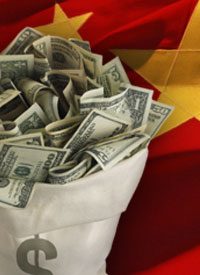
Now, however, China is struggling to deal with the global economic downturn. To stimulate its own economy, the Chinese central bank is now making more funds available for domestic loans instead of buying foreign debt. Moreover, multinationals, responding to the recession, are scaling back investment in China. Chinese and international investors alike are moving large amounts of money out of China and into safer financial havens after the collapse of the Chinese stock and real estate markets. Finally, the Chinese trade surplus is falling as demand for Chinese-manufactured consumer goods falls worldwide.
All of these factors have conspired to create a money drain, leaving the Chinese government far less able and less inclined to continue buying enormous amounts of debt from the U.S. government. Should the Chinese market for Treasuries disappear altogether, the U.S. government will have few options left for borrowing money to stave off financial collapse.
The declining Chinese appetite for purchasing U.S. government debt is but the latest worrisome sign that global confidence in the dollar is in serious decline. Those who naively believe the U.S. government incapable of refusing to honor its financial obligations would do well to study their history. It was, after all, the sudden British refusal to continue redeeming the pound sterling in gold on September 20, 1931, that triggered a global financial panic and deepened the Great Depression — this only two days after the Bank of England’s wily Governor Montagu Norman assured the Dutch (who, like most of the rest of the world, had huge holdings of British pounds) that Britain would not go off the gold standard.
The stark reality is that the U.S. government is bankrupt, and no amount of taxation or printing money will alter this reality. The Chinese, it seems, have diagnosed this, and are preparing to reduce their reliance on the say-so of the U.S. Treasury Department. Such a development will result only hasten the long-overdue day of financial reckoning.



